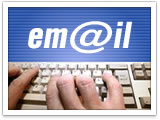
|
Follow Me On: |
 |
Kathleen Petty AVP/Sr Mortgage Originator Global Credit Union Home Loans AK#157293 Phone: (907)261-3458 Cell: 223-4440 Fax: (907)929-6699 License: NMLS Unique Identifier #203077 K.Petty@gcuhome.com https://www.globalcu.org/home-loans/resources/originators/Kathleen-Petty/ |
 | ||
| ||||
June 2006

|
Lost in Translation How to Write an Effective Email
In today's high-tech world, it seems as though everyone is using email on some level. Whether you're downloading it on a weekly basis or receiving it in real time on your BlackBerry™, there's no denying that electronic mail is here to stay. According to bCentral.com, Microsoft's initiative to support small business owners, the number of individuals with Internet connectivity reached 1 billion in 2005. With such a large number of people communicating online, the ability to write an effective email is only becoming more important with each passing day. Most of us have been on the receiving end of ineffective emails or ones that come off differently than intended. Then there's the email, usually from a friend or co-worker, with a message that's so befuddled you can't even begin to make heads or tails of it. There's also the issue of writing an email that ends up never being seen by the reader. This frequently happens when writing to newer users, whose inboxes are bursting at the seams with spam for everything from Viagra to bogus stock tips. These are very real problems; and most of us come dangerously close to becoming entangled in them on a daily basis. Here at YOU Magazine, we decided to take a closer look at this issue and how to solve it. We have compiled some tips that will help you to communicate your message clearly and ensure that it's read. Before we get started, let's explore some of the pitfalls of emailing. The first pitfall has to do with numbers. If you take the quantity of people who have online access, combine this with the quick turnaround time of an email and its relatively low cost, what you'll get is an awful lot of emailing. Before you send out electronic correspondence, keep in mind that you may be competing with a large number of people with similar interests. This makes it even more important to get your message right. Secondly, because the turnaround time is so fast, writing contained in emails is inherently sloppy. This includes everything from the planning stage to the proofreading. So while you're saving time by using this technology, it's still worth investing the extra minutes needed to keep it error-free. The third pitfall to keep in mind is that email is conversational; but it's a conversation which contains no vocal inflections or body language. These problems are typically nonexistent in letter writing due to its more formal nature. A perfect example of this is sarcasm. This technique may work when delivered in person. In terms of emailing, however, sarcasm could mean the difference between getting a promotion and losing one. That being said, here are some of the things you should do when writing an email: Have a Meaningful Subject Line Keep Focused
Also, always begin your email with your most important points. It's been shown that most people scan emails, losing interest the further they go. By starting with your less important material, you increase the likelihood that your email won't get the attention it requires. This is also why it's important for the message to be as succinct as possible and outlined (at least in your head) before it's written. Play by the Rules
Also, avoid using fancy fonts as well as your "Tab" button. Many people's email readers aren't equipped to handle strange fonts or indentions. Use standard fonts such as Times New Roman or Arial. When you begin a new paragraph, try skipping a line rather than tabbing over. Avoid Spamming and Attachments
Attachments aren't necessarily a bad thing; however, the rule is that if you can fit your message within the body of an email, then you should do so. Attachments take time to download, may carry viruses, and take up space on a recipient's hard drive. In addition, they don't always translate, especially if the reader is opening the email on a PDA. Be Nice
It's also important to keep in mind that email is not always confidential. Once you've put something in writing, it can be used against you at a later time, potentially even in court. Delicate situations require your personal attention. Do not take the easy way out and risk having it haunt you down the road. Proofread, Proofread, Proofread
One final tip to keep in mind is always respond to emails as promptly as possible. Nobody likes it when they send an email only to receive a reply, along with an excuse, weeks later. Being timely with your response is a great first step towards achieving clear and courteous communications. | |||||||||||||||||||||
License #AK157293 You are receiving a complimentary subscription to YOU Magazine as a result of your ongoing business relationship with Kathleen Petty. While beneficial to a wide audience, this information is also commercial in nature and it may contain advertising materials. INVITE A FRIEND to receive YOU Magazine. Please feel free to invite your friends and colleagues to subscribe. SUBSCRIBE to YOU Magazine. If you received this message from a friend, you can subscribe online. UNSUBSCRIBE: If you would like to stop receiving emails from Kathleen Petty, you can easily unsubscribe. Global Credit Union Home Loans AK#157293 |
, 125 W Dimond Blvd #110 Anchorage, AK 99515 Powered by Platinum Marketing © Copyright 2024. Vantage Production, LLC. | |||||||||


